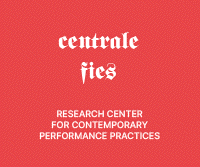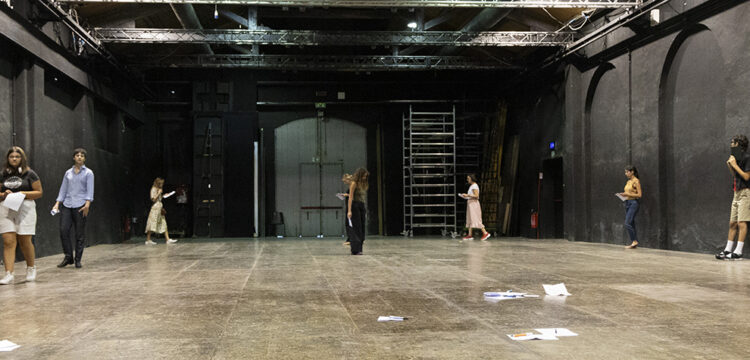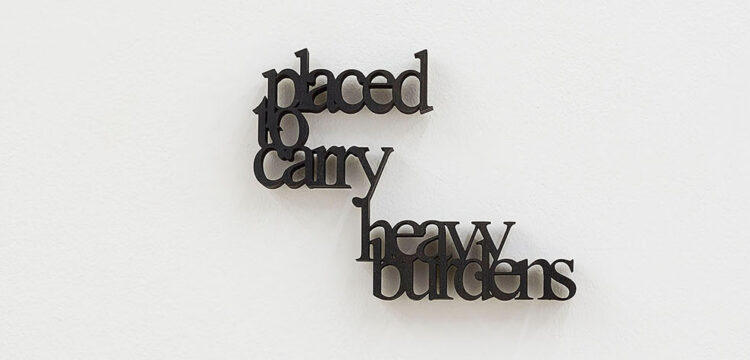Glimpses in the Dark
A conversation with Feel Good Cooperative
On October 12th, If Body ended with the performance Le Colonne della Colombo by Feel Good Cooperative, an artistic collective of Colombian trans sex workers and their allies.
Together with the public, the collective crossed Via Cristoforo Colombo, one of the main arterial roads in Rome, and other locations around the EUR district, in the southern periphery of the city. This neighbourhood is the result of a fascist urban planning system which was meant to inscribe into the city’s road pattern straight trajectories of expansion toward the Mediterranean Sea, as a symbolic representation of the regime’s colonial project.
On October 12th, a day celebrated in many countries as Columbus Day, such references were poetically and irreverently subverted by Feel Good Cooperative, as a collective and desiring body of more than one hundred people was guided on a performative journey to re-signify those sites of exploitation and power through a polyphony of voices.
If Body is a public visual and performing arts program that focuses on the body as an artistic language and learning methodology based on experience and participation. Conceived and curated by Sara Alberani and Marta Federici (LOCALES), it presents new performances, talks, workshops and exhibitions that explore the cultural, social and political meanings associated with the body and corporeality through six events. The first edition involved interventions by Amelie Aranguren (INLAND – Campo Adentro), Marie Moïse e Mackda Ghebremariam Tesfau’, Pauline Curnier Jardin & Feel Good Cooperative, Adelita Husni Bey and Holly Graham.
Conceived by Chiara Pagano with the artists of the If Body 2023 program, a series of editorial features delve into each specific event and happening.
Chiara Pagano: In spring 2020, during the Italian lockdown, artist Pauline Curnier Jardin, in collaboration with photographer and sex worker Alexandra Lopez, and architect and academic Serena Olcuire, organized a workshop inviting a group of Colombian trans sex workers based in Rome: Andrea, Alexandra Mapuchina, Gilda Star and Giuliana. A working team that, although consisting of very different figures and personalities, gave birth to Feel Good Cooperative. How did you meet and how did this first project lead you to become allies under the same collective?
Feel Good Cooperative: Our collaborations have developed over time, shaping themselves around circumstances, desires, and relationships that gradually bound us together. Alexandra and Serena began collaborating in 2017, during Serena’s PhD research, which focused on the geographies of sex work in the city of Rome. From the interviews and mappings constructed together, a very challenging friendship blossomed.
Then came the lockdown, a tough period for sex workers. Like in many other countries, sex workers bore the brunt of the COVID-19 countermeasures: social distancing prevented sexual performances, and due to the absence of formal recognition in Italian legislation, they had no access to any form of welfare or economic support.
During this time, Pauline was living with her family at the Villa Medici, that is the French Academy in Rome, as a fellow resident. The Academy was a sort of “gilded cage”, and the privilege of working there was particularly dissonant during the Covid pandemic, and that’s why Pauline decided to redistribute her production budget among a small community of sex workers. She met Serena and Alexandra, and through this collaboration, a group of Colombian sex workers got together. During some drawing workshops, the group produced a series of illustrations depicting scenes from their work, their places in the city, and their fantasies. Each one of the involved sex workers was paid for their art piece(s) the same amount they would have been paid for a “marchetta” (sex job) before the Covid pandemic. The collection was then exhibited at Villa Medici.
The project created a space of expression for workers whose daily life is bound to intimacy and the foreign body; it offered a creative way to reinvent welfare compensation and enlarge the audience who has the right to access it. Also, it was an attempt to hack the economics and the place of a very formal and enclosed institution—by stressing the boundaries of what is considered acceptable within it and, at the same time, by soliciting it on the grounds of the material needs of Roman inhabitants.
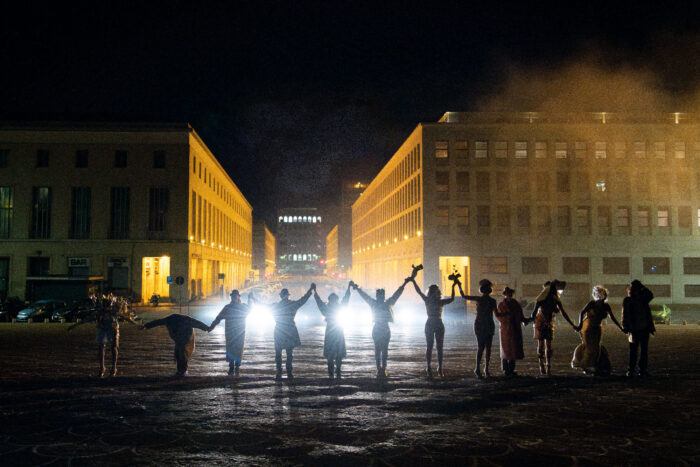
The voices of sex workers are often hidden or eclipsed by stereotypical representations. Feel Good Cooperative is an artistic project and, insofar, it opens direct access to a new dimension, where the personal and the political meet. Do you think art can facilitate breaking the sex work’s stigma?
Of course, the Cooperative works on representations of sex work based on the expressive effort of those who engage in it: prostitution has been narrated mostly by male artists, filmmakers, and screenwriters, and none of them was a sex worker anyway. It is yet another occasion when women (cis or trans, particularly from countries in the global south) are not given a space within which to express their identity. The Feel Good Cooperative recognizes how the image of sex workers is constructed and disseminated by a geopolitically (Western) and socially (patriarchal) hegemonic culture. The subjectivities who are represented do not have the opportunity to narrate not only their activities but also their lives, their places, and their worldview. The Cooperative is made up of people who look at the city with loving, sharp, critical, lascivious, sarcastic eyes. And they want to speak out freely.
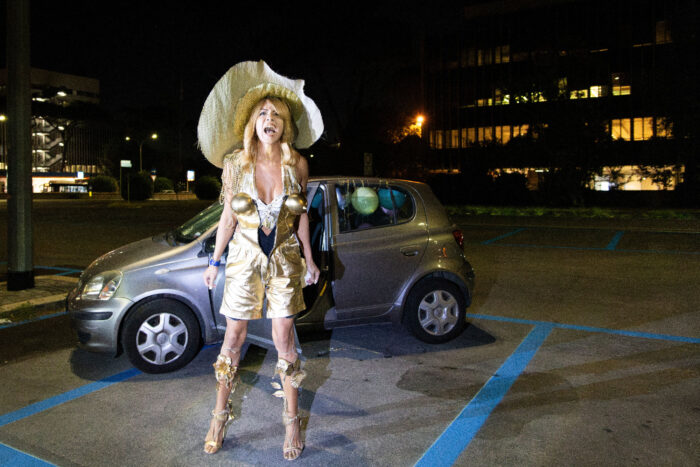
Another fundamental aspect that emerges from your artistic work concerns the defence of women workers’ rights. How do you regulate your remuneration in this field?
We are deeply committed to this issue, even though we have not resolved it yet. We are trying to understand how to organize and allocate resources on a practical level. For example, beyond the individual fee as artists, we are addressing the problem of dividing revenues from the sale of artworks on the market: what amount goes to each member, what amount to the Cooperative as a collective entity? But then there are even broader issues. In principle, we adhere to the idea that work should be compensated. Similar to paying for the time invested in a sexual performance, we believe in compensating for the time devoted to an intellectual performance. However, it is not easy because, as those engaged in cultural work are well aware of, funds are never sufficient to remunerate every single hour of commitment (think about the time spent on brainstorming, studying, or doing site surveys!). Additionally, we come from diverse professional backgrounds, each accustomed to different methods of working. This aspect is perhaps the most challenging and interesting: compensation becomes a field of encounter and confrontation, concerning dynamics of self-exploitation internalized by those who work in the fields of art, research, or culture. Such dynamics are tested against those who have a clear understanding of the value of their bodies, brains, and time.
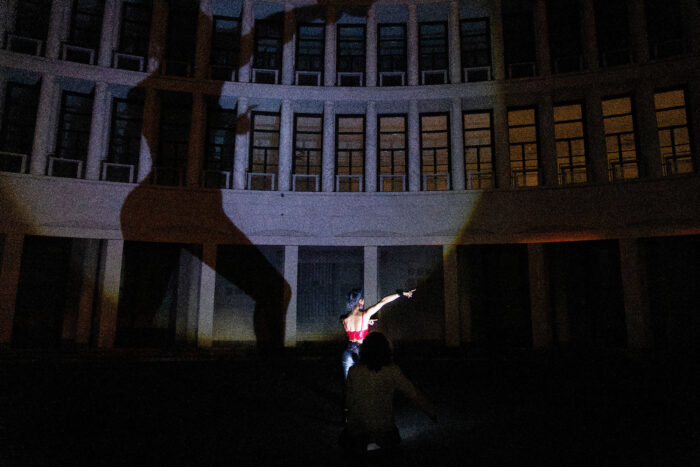
In the context of If Body 2023, you presented two different works: a screening of your film Fireflies – accompanied by a talk in the context of Short Theatre – and an itinerant performance in which you invited the participating audience to attend the shooting of your new film: Le Colonne della Colombo. On this second occasion, you gathered a body of more than a hundred people and together we crossed the Cristoforo Colombo, which, besides being among the main streets of the EUR district known for its fascist and colonialist heritage, is also one of the main sites for sex work. Could you tell us how the performance was structured? In which exact locations in this neighborhood did you want to lead the audience? What kind of narrative did you want to create?
On October 12th, Columbus Day is observed, and numerous countries commemorate the navigator’s arrival in the New World (“new” to him). Despite Columbus’s evident lack of brilliance and understanding of this geography, an entire country, Colombia, is named after him; the same geography many of us hail from. The colonialist values symbolized by Columbus are increasingly criticized and subverted nowadays, leading to the questioning of his monuments scattered worldwide.
In Rome, we have Via Cristoforo Colombo, designed during the fascist regime for the 1942 World’s Fair, a location that would later become EUR. The rhetoric of celebrating masculine, Italian, fascist grandeur quietly echoes throughout the neighbourhood, marked by statues and carvings that continuously evoke the spectres of the country’s colonial past. Quite predictable, when we consider that originally the street was named Via Imperiale.
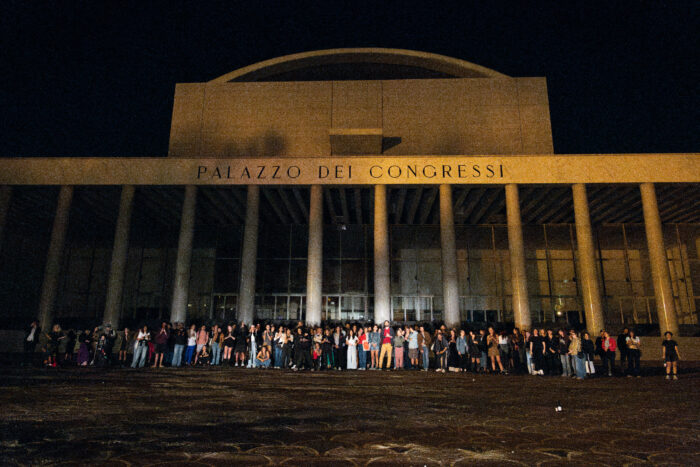
However, our knowledge of Via Cristoforo Colombo is different. We’ve traversed it during long work nights, and we decided to propose our very personal Colombo tale. An obelisk, an unlit fountain, a colonnade, a parking lot, a gas station, a grove, and a convention building—we organized a sequence of small performative stages, brief glimpses into the sex work life on Colombo street, blurring the lines between dreamlike and real dimensions. We selected some spots we knew and some that inspired us at the very moment, populating them with our own myths, symbols, and bodies. We intertwined monumentality and movement, challenging power figurations by boldly flaunting our asses. The same bodies that are usually harassed by the police and forced out of sight.
We had a permit from the Rome Municipality to occupy public ground by performing–a nice way to hack the possibilities of institutional art, isn’t it?
From Villa Medici onward, we continue to experiment with such strategies. In the midst of fascist bas-reliefs, we brought India Catalina, and among bodies carved in white travertine, our marble golden boobs stood proud. We allowed the audience to follow us, guiding them with imposed physical placements, confusing directions, and mixing scheduled and improvised events. Some were amused, some unnerved, and some others applauded, soughting didactic frames of meaning. Yet, in the end, the action addressed the bodies—ours and the collective body we created with the audience, and more importantly, the place itself. In this sense, we feel that the performative gesture will remain engraved in the EUR’s DNA forever.
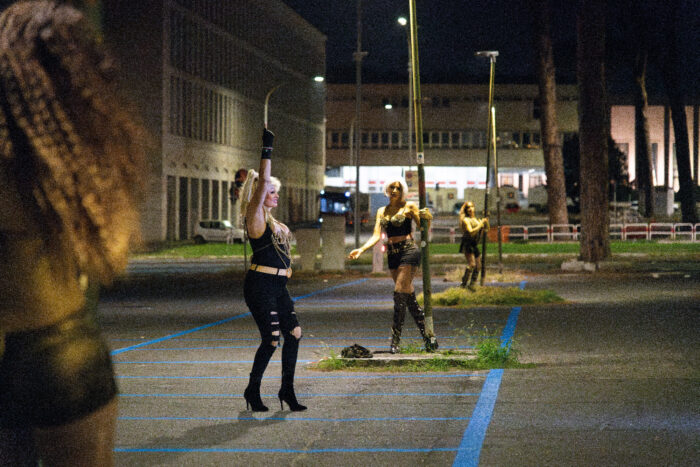
On this occasion, each of you performed a specific role that, although part of a fictional and constructed score, carried real gestures and situations into the scene. What does it mean to perform on stage, in front of such a large and diverse audience, what is your job for you? Thus, also, how does sex work influence your artistic practice and vice versa?
We do not perceive a sharp distinction between the real and the acted. After all, we navigate performativity in all its forms. In Colombia, there was no Lady Oscar; we grew up with Jem, who taught our generation the essence of performativity. Judith Butler informed us that gender is performative, but we already were well aware of that. It is through performance that gender and sexuality take shape in space. Performance, however, serves as a theatrical metaphor that helps us conceive of space as a stage: a stage for out-of-place, unexpected bodies, for transgressing normativity; a stage for showcasing our fabulousness when we choose to display ourselves, our bodies, and our outfits; and it is a stage for working, whatever that may entail—whether giving a public speech, selling a performance, or leading a hundred people on a walk through the EUR. There are differences, and naturally, each performance requires distinct preparation. But, at the end of the day, it’s always about being on stage. As Gloria Trevi says, “Todos me miran, me miran, me miran / Porque sé que soy linda, porque todos me admiran / Y todos me miran, me miran, me miran / Porque hago lo que pocos se atreverán / Y todos me miran, me miran, me miran / Algunos con envidia pero al final, pero al final / Pero al final, todos me amarán.”
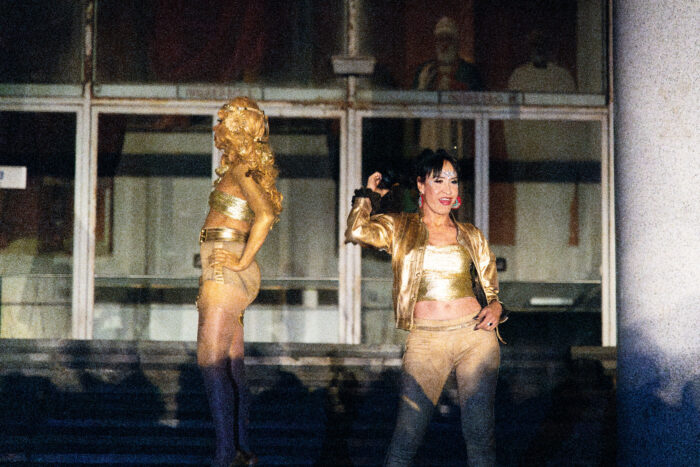
You wanted to meet the audience in the late afternoon, at sunset, when the lights turn on to brighten everything. A choice that undoubtedly leads to reflection around the topic of darkness, a dimension that you inhabit on a daily basis and that immediately refers back to your film Fireflies. What is your relationship with darkness?
Much has been told about darkness. Pasolini depicted the darkness of bourgeois life that “devours fireflies”. On the contrary, Didi Huberman says that fireflies have vanished in the blinding glow of the contemporary spotlight. Some describe the night as an increasingly dark and exclusionary period for human rights. In feminist discourse, the night represents the space-time denied to “respectable” women. For us, it has been and continues to be home, a realm, a field of possibilities, encompassing hiding and performing, solitude and friendship.
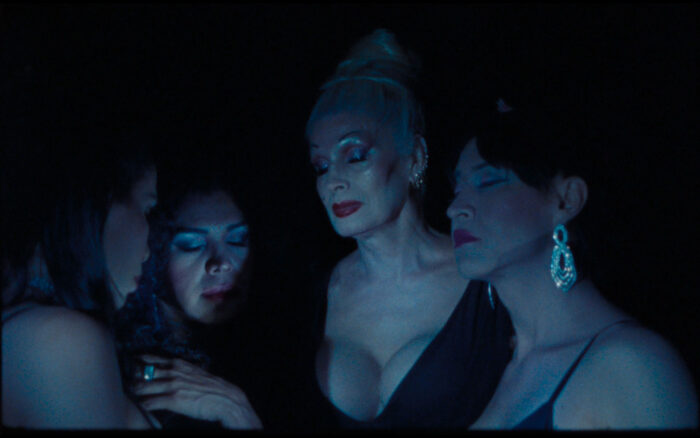
The night conceals and frightens because it disrupts the silence of the sleeping city, and in its concealment, the night transforms everything: in darkness, cats become panthers—that is part of each one of us. Yet, the night also means transgression, complicity, and desire.
Some of you (whom we refer to as etero-noiosi, hetero-boring) may not see the parallel world that is Gloria’s night, sparkling with sequins when observed. Fortunately we are here for you, to illuminate darkness.



